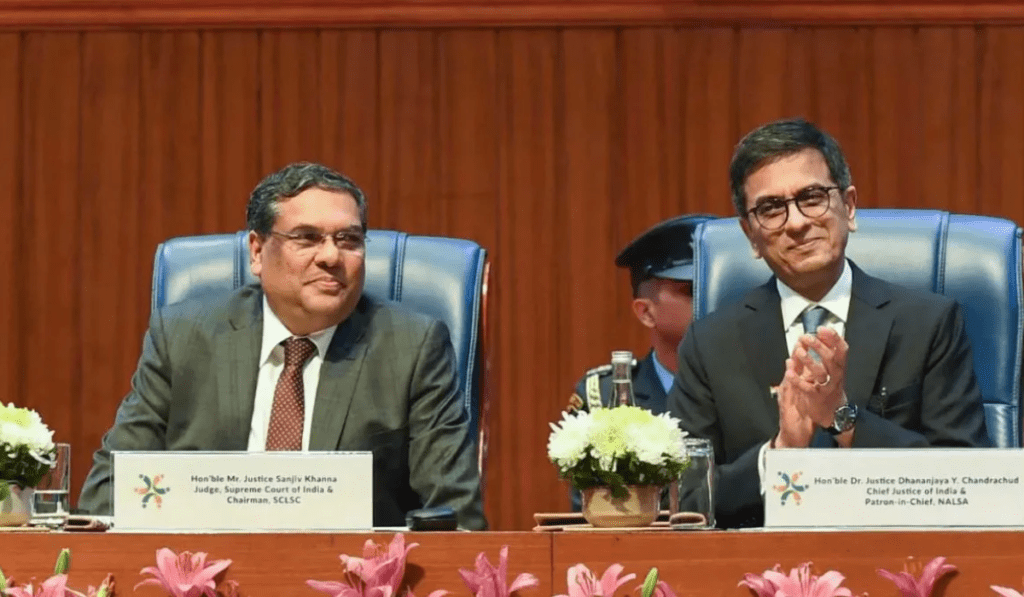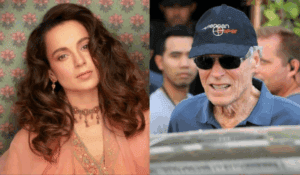Justice Sanjiv Khanna, who was recommended by Justice DY Chandrachud as his successor. Take the oath of office as the 51st Chief Justice of India on Monday.
President Droupadi Murmu administered the oath of office to Justice Sanjiv Khanna at Rashtrapati Bhavan.
The ceremony was attend by Prime Minister Narendra Modi and the outgoing Chief Justice of India, DY Chandrachud.
On October 24, the Centre officially announced Justice Khanna’s appointment, based on the recommendation of Chief Justice Chandrachud. November 8 marked Justice Chandrachud’s final working day, with judges, lawyers. And staff of the Supreme Court and high courts giving him a warm and heartfelt farewell.
Justice Sanjiv Khanna has been involved in several significant Supreme Court rulings. Including affirming the integrity of EVMs. Striking down the electoral bonds scheme, supporting the revocation of Article 370, and granting interim bail to former Delhi Chief Minister Arvind Kejriwal.
Also Read:Our Hindutva aligns with Shahu-Phule ideals: Shinde
Justice Khanna comes from a distinguished family in Delhi. He is the son of former Delhi High Court judge. Justice Dev Raj Khanna and the nephew of the renowned former. Supreme Court judge HR Khanna.
Justice Sanjiv Khanna Takes Oath As 51st Chief Justice Of India
Justice Sanjiv Khanna, who became a Supreme Court judge on January 18, 2019. was a third-generation lawyer before his appointment to the high court. He is deeply committ to addressing case backlogs and accelerating the delivery of justice.
Justice HR, the uncle of Justice Sanjiv Khanna, made headlines in 1976 when he resigned after delivering a dissenting opinion in the controversial ADM Jabalpur case during the Emergency.
The majority ruling of a Constitution bench, which upheld the suspension of fundamental rights during the Emergency, was regard as a “dark chapter” in the history of the judiciary.
Justice HR Khanna deemed the move unconstitutional and contrary to the rule of law. As a result, he paid the price when the central government bypassed him and appointed Justice MH Beg as the next Chief Justice of India.
Justice HR Khanna was a key member of the bench that delivered the landmark judgment in the 1973 Kesavananda Bharati case, which established the basic structure doctrine.
Justice Khanna, born on May 14, 1960, pursued his law studies at the Campus Law Centre of Delhi University.
He serve as the executive chairman of the National Legal Services Authority (NALSA) and was enroll as an advocate with the Bar Council of Delhi in 1983. Initially, he practiced at the District Courts in the Tis Hazari complex before moving on to the Delhi High Court.
Justice Khanna had an extensive tenure as the senior standing counsel for the Income Tax Department. In 2004, he was appoint as the standing counsel (Civil) for the National Capital Territory of Delhi.
Justice Khanna served for an extended period as the senior standing counsel for the Income Tax Department. In 2004, he was appoint the standing counsel (Civil) for the National Capital Territory of Delhi
Also Read:Wardha Factory Blast: 22 Workers Injured in Explosion at Steel Plant











More Stories
Box Office Collection: वीकेंड खत्म होते ही ‘भूल चूक माफ’ की कमाई में भारी गिरावट, जानें बाकी फिल्मों का भी हाल
Kangana Ranaut hails Clint Eastwood for working at 95, calls him ‘yogi’: ‘People like him make artists look so good’
Ishaan Khatter makes fans scream as he pulls off butter smooth dance moves at Miss World 2025: Watch